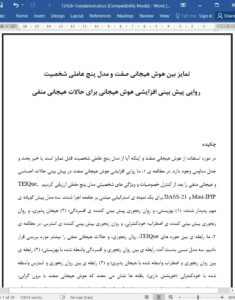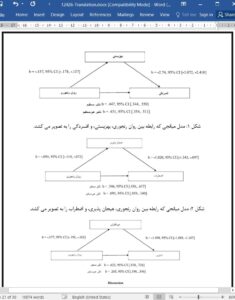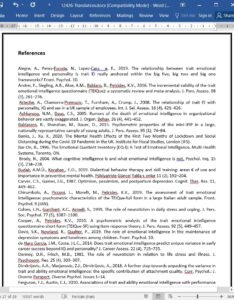Abstract
There is ongoing debate on the utility of trait emotional intelligence and whether it is distinguishable from the five-factor model of personality. In study 1, we investigated the incremental validity of trait emotional intelligence in predicting negative emotional states, after controlling for the five-factor model personality traits. The TEIQue, Mini-IPIP, and DASS-21 were administered to a community based Australian sample. Three significant predictive models emerged: (1) wellbeing, and neuroticism predicting depression; (2) emotionality, and neuroticism predicting anxiety; and (3) self-control, and neuroticism predicting stress. In Study 2, we further explored the relationship between TEIQue domains, neuroticism, and negative emotional states. Three partial mediation models were found: (1) wellbeing mediated the relationship between neuroticism and depression; (2) emotionality mediated the relationship between neuroticism and anxiety; and (3) self-control mediated the relationship between neuroticism and stress. The findings highlight that trait emotional intelligence is related to, and yet distinct from extraversion, conscientiousness, agreeableness, neuroticism, and openness. They also provide support for the incremental validity of the TEIQue domains in predicting depression, anxiety, and stress, beyond the five-factor model personality traits in a community based Australian sample, with the domains of trait emotional intelligence potentially operating as protective factors from pervasive negative moods.
1. Introduction
The concept of emotional intelligence (EI) coined by Salovey and Mayer (1990) refers to the ability to perceive, express, and regulate one's own emotions, and understand the emotions of others. EI has been operationalised as both an “ability” based model, and a “trait” based model. Interestingly, the two perspectives of EI are found to weakly correlate (Ferguson and Austin, 2010; Qualter et al., 2012) and show different patterns of associations with other cognitive constructs (e.g., personality, Dimitrijevi�c et al., 2018; theory of mind, Ferguson and Austin, 2010; intelligence, Karim and Shah, 2014; academic ability, Qualter et al., 2012).










